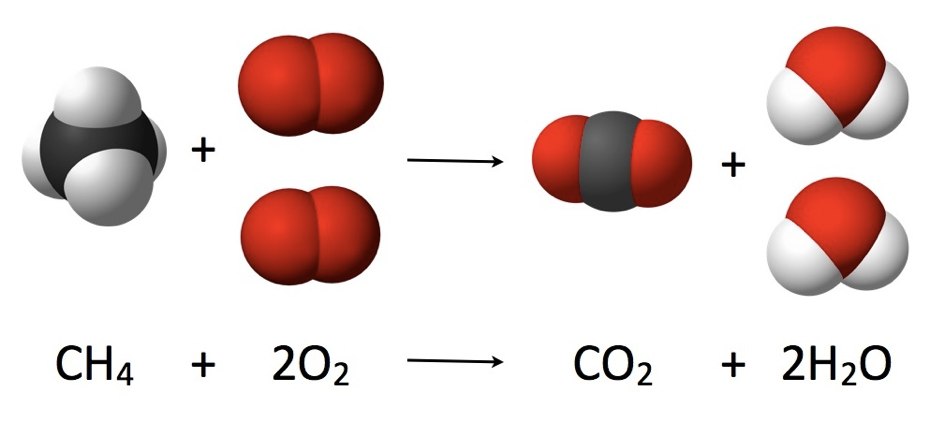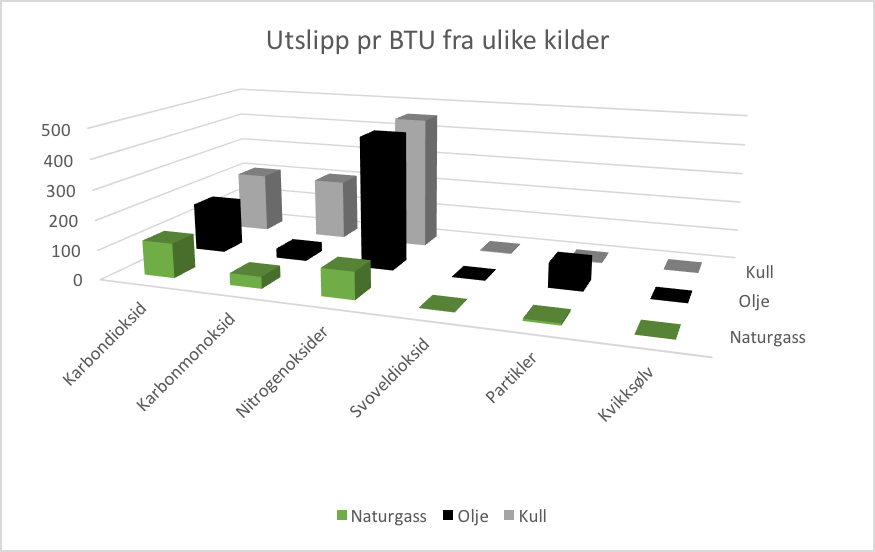About natural gas / Environmental benfits
Environmental benefits with Natural Gas
Natural gas has many environmental advantages compared to oil, other gases or coal produced electricity. The reduction in CO2 emissions is significant, but there are also other important environmental benefits. Massive reduction of NOx, and near elimination of sulphide, dust and particles contributes to a better climate, locally and globally.
Natural given chemical advantages
Natural gas consists mostly of methane (CH4). When combusted 1 methane molecule will react with two water molecules and is transformed into 1 molecule if carbon dioxide and 2 water molecules and 891kJ of energy. What looks like exhausts from burning natural gas is only water vapour and carbon dioxide.

Other fuels like propane and oil products area heavier and consists of molecules with more carbon atoms. As an example; propane (C3H8), 3 carbon atoms and 8 hydrogen atoms. The more carbon in the molecule the higher emissions of CO2.
As a result of natural gas having the lightest/simples hydrocarbon, it has lower CO2 emissions than all other hydrocarbons. Generally, emissions of CO2 will be reduced with 25%.

Liquified Natural Gas (LNG)
LNG is natural gas cooled to about -162°c (-260°F), at this temperature the gas is in a liquid state. The cooling leads to a reduction in volume by 6000%, thus the gas can effectively be transported and stored in vacuum insulated tanks on trucks, containers and ships. LNG is therefore a more flexible and storage friendly solution than pipeline gas or compressed natural gas (CNG)Less risk with Natural Gas
In case of a gas leak the risk of ignition is low. Natural Gas needs a specific gas/air ratio of about 5-15% to be flammable. If there’s less natural gas than 5% the mix is too thin to burn and if there’s more than 15% gas the mix is to rich. In addition natural gas need a high energy spark to ignite. The ignition temperature is 540°c or 1004°FIf there is a LNG leak the fluid/gas will be heavier than air as long as the temperature is lower than 100 °C (212 °F). It will quickly vapour to a gas-state, rise and mix with air to a non-flammable mixture. Other and heavier gases will normally fall and stay close to ground where they can form a flammable area.
In case of a leak or LNG spill there could temporary be flammable areas over the leak/spill. Therefore it is important to control all sources of ignition.
Natural gas Is not toxic
Natural gas have no colour or smell and is not toxic. A natural gas leak could still influence the amount of available oxygen when in a closed space. LNG could be dangerous if someone comes into direct contact with the supercooled gas. Generally, natural gas is considered a very safe gas, and is therefore often used as a household gas.Local effects in case of spills/emissions
A leak of natural gas or LNG will have minimal effect on plant and animal life, with exception of anything in direct contact with LNG/gas in a supercooled state. This in contrast to oil spills from shipping, transport or oil-tanks that have a massive negative environmental impact and could lead to large costs.Still, leaks of natural gas should not occur. Barents NaturGass therefore implement safe operation procedures and use the most modern and advanced equipment available.
Natural Gas reduces emissions
CO2
NOx - Approx.
Sulphide
Dust and Particles
More advantages with Natural Gas
Learn more about Natural Gas
see natural gas facts
Learn more about our products
LNG for Shipping



